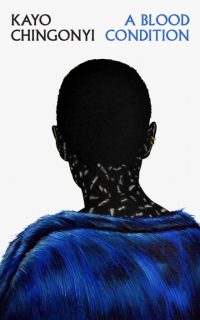A Blood Condition (Shortlisted, Forward Prize for Best Collection & T S Eliot Prize)
Kayo Chingonyi steps back into a place where the imagination and memory become one. Born in Zambia, brought up in London, and now teaching at Durham University, his collection explores the multiplicity of identity and the emotions that flow into it.
The opening poem of the collection introduces the reader to the cultural backdrop in which the collection is set. ‘Nyaminyami’ is a prose poem, introducing the work as if the beginning of a moral tale, ‘in such a place our story begins.’ It begins with peace and harmony as the people worshipped and trusted the eponymous river god. Depth is created with the phrase ‘our story’ as the speaker is both referring to the citizens of Zambia and humankind as a whole. This tale foreshadows events already passed, creating pathos as the events and atrocities are listed, not stopped by enjambment or caesura. The Mockton Commission, chitupas (ID cards for black citizens), power shortages, corporate greed and exploitation, and HIV – leading up to a present-day dystopia, where the ‘boom’ of the Copperbelt has its inevitable downfall. ‘Nyaminyami’ creates a dramatic beginning to the collection as the speaker warns against consequences of playing God.
After the introduction of the river god, water becomes a constant motif, flowing, and occasionally, dripping through the poems. The metaphor of blood like water, draining out of Zambia, with the HIV crisis, into the Congo Basin, is used throughout Origin Myth, a seven-sonnet poem. ‘Zero’, the first, referring to HIV’s ‘patient zero’ makes this comparison:
Making a fist she raises it up
to stem the flow and marvel as it slows;
a haemoglobin beck between her toes.
Using ‘beck’, a Yorkshire term for stream, Chingonyi illustrates his Northern identity combined with his ‘origins’ in Zambia, creating the unsettling image of a stream of blood, and developing its association with life-giving water. The empowering imagery of a raised fist in defiance is contrasted with the grave injury, not just to this one person, but to ‘simian blood’ across the globe as it spreads. However, the title of Origin Myth demonstrates that the original tale of patient zero is just a story, and as Chingonyi’s attempts to grasp at the story of his heritage, it becomes fiction.
The most striking element of Chingonyi’s second collection is the musicality, something he was commended for in his debut collection, Kumukanda. One poem takes the form of a rap (‘16 Bars for 16 Bits’) and another, ‘Blues for Albert ”Prodigy” Johnson and Carl ”Haystee” Samuel’, is an ode to two rappers who tragically died young. These artists and genres hugely impacted Chingonyi’s understanding of rhythm and musical identity, as the amalgamation of blues, a genre associated with black defiance against oppression is used performatively to celebrate and mourn the loss of rap musicians, a genre that also stems from oppression and was historically associated with black communities.
He uses the cultural sound of music to unravel the ‘myth’ or his origins. Jazz and hip hop also appear within the collection, and the history of the music, and its heritage, mirrors Chingonyi’s own, as he develops and changes as he moves from place to place, stemming from African heritage. This is evident in the quatrain within ‘Geneology’, called ‘Inheritance’, which attaches identity to objects,
Amid the clothes and shoes and electronics,
this, your most apposite bequest: a box of cassettes,
each one signed with your initials,
that we might once again inhabit the same room.
Although she has left her possessions to him, it is only through music that he finds a connection with his mother once again. The use of music in the collection demonstrates, with each beat, that it is a core part of his identity. A Blood Condition is a rhythmic reflection on belonging to the present while working through the past.
Thomasin Collins


Leave a Reply